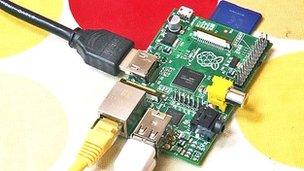Google funds computer teachers and Raspberry Pis in England
- Published

Mr Schmidt made headlines when he criticised UK computing classes
Dozens of teachers specialising in computer science are to work in English schools thanks to a partnership between Google and the charity Teach First.
Google's chairman Eric Schmidt said money would also be provided to buy "teaching aids, such as Raspberry Pis or Arduino starter kits".
He said that without investment in the subject, the UK risked "losing a generation" of scientists.
Mr Schmidt had previously criticised the country's ICT curriculum.
He had said the UK was "throwing away [its] great computing heritage" by focusing on using software rather than how it was made.
The comments, delivered last August at the Edinburgh International Television Festival, prompted education secretary Michael Gove to revamp the curriculum to incorporate programming and other tech skills.
Teach First
Speaking on Wednesday at London's Science Museum, Mr Schmidt outlined further plans: "Put simply, technology breakthroughs can't happen without the scientists and engineers to make them. The challenge that society faces is to equip enough people, with the right skills and mindset, and to get them to work on the most important problems."
Despite acknowledging progress, he described computer science education in the UK as still being in a "sorry state".
He announced that Google would provide the funds to support Teach First - a charity which puts "exceptional" graduates on a six-week training programme before deploying them to schools where they teach classes over a two-year period.
Many stay on beyond that term while others pursue places at leading businesses associated with the programme.
At present the scheme is limited to seven regions of England: East Midlands; Kent and Medway; London; North East; North West; West Midlands; and Yorkshire and Humber.
Mr Schmidt said the donation would be used to train "more than 100 first rate science teachers over the next three years, with the majority focused on computer science".
Rebooting computing
He said that he hoped up to 20,000 students would benefit in "disadvantaged communities".
"It's vital to expose kids to this early if they're to have the chance of a career in computing," Mr Schmidt added.
"Only 2% of Google engineers say they weren't exposed to computer science at high school.
"While not every child is going to become a programmer, those with aptitude shouldn't be denied the chance."
Each of the 100 teachers will have a small bursary to buy equipment relating to their teaching. The Raspberry Pi, a low-cost computer designed in the UK, will be used in the scheme.
"The success of the BBC Micro in the 1980s shows what's possible. There's no reason why Raspberry Pi shouldn't have the same impact, with the right support," Mr Schmidt said.

The Raspberry Pi runs off Linux-based operating systems
Turing anniversary
Google has also sponsored a new exhibition at London's Science Museum showcasing the life and career of Alan Turing.
It is due to open next month to coincide with the 100th anniversary of the computer pioneer's birth.
In 2014, the museum will open a new gallery, also funded by Google, showcasing modern communications.
Mr Schmidt said he hopes such exhibits can equate to an image change for engineering.
"Rebooting computer science education is not straightforward.
"Scrapping the existing curriculum was a good first step - the equivalent of pulling the plug out of the wall. The question is now how to power up."
- Published23 May 2012
- Published29 February 2012
- Published14 December 2011